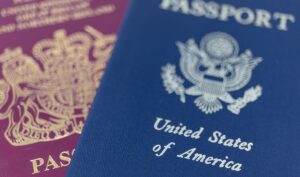
Contrary to popular belief, children (minors under the age of 18) generally cannot naturalize as U.S. citizens of the United States. By law, applicants for naturalization must be 18 years of age. But don’t worry. This means that children cannot file the naturalization application or be included on their parents’ application. Instead, children who meet certain criteria automatically gain U.S. citizenship when a parent naturalizes, a provision in the law known as "derivative citizenship" for children.
How Children Derive U.S. Citizenship from Parents
Child Citizenship Act
Adult permanent residents apply for U.S. citizenship by filing Form N-400, Application for Naturalization. But minor children (under age 18) may not use this form. Under Section 320 of the Immigration and Naturalization Act, also known as the Child Citizenship Act of 2000, children under 18 automatically derive citizenship status from their parents if the following three conditions have been fulfilled:
- At least one of the child’s parents is a U.S. citizen by birth or naturalization;
- The child is a permanent resident under 18 years of age;
- The child is residing in or has resided in the United States in the legal and physical custody of the U.S. citizen parent.
Once all three conditions are met at the same time, the child is a U.S. citizen by matter of law. The order of events makes no difference. If a child is a permanent resident and under 18, and then at least one parent naturalizes, the child automatically becomes a U.S. citizen. If a parent naturalizes and then the child gets permanent residence, the child becomes a U.S. citizen the moment they become a permanent resident, if that happens before the child is 18.
The law covers adopted children as well as biological children. But stepchildren may not derive citizenship from a stepmother or stepfather under this provision.
Effective Dates for Derivative Citizenship
The effective date of the Child Citizenship Act is February 27, 2001. Therefore, persons under the age of 18 on or after that date who met/meet the requirements of the law automatically derive U.S. citizenship. However, the Child Citizenship Act does not cover persons who were 18 years of age or older as of February 27, 2001. These people may, however, have acquired U.S. citizenship in accordance with prior versions of U.S. immigration law. Please consult with an immigration attorney if you feel this may apply to your situation.
Examples of Derivative Citizenship for Children
Example 1
The Lee family consists of two parents and three children. They all live in the United States as permanent residents. Recently, Mr. Lee naturalized as a U.S. citizen. Automatically upon their father’s naturalization, the three young children (all under age 18) immediately derive U.S. citizenship.
Example 2
Mr. and Mrs. Jones are both U.S. citizens by birth. They adopted a baby girl from a foreign country. The child entered the United State as a lawful permanent resident. This child automatically became a U.S. citizen upon admission, as she then met all the requirements outlined above.
Example 3
Mr. Reyes is a naturalized U.S. citizen living in the United States. He recently married an Filipino citizen residing in the Philippines. His new wife also has an existing minor child that is immigrating to the U.S. Unfortunately, the step child does not qualify for derivative citizenship in this situation. The step child may derive U.S. citizenship once his mother naturalizes as a U.S. citizen, as long as he is still under 18 years of age. If he reaches age 18 before his mother naturalizes, he can file Form N-400, Application for Naturalization, on his own.
Documentation of U.S. Citizenship for Children
It's not mandatory, but it is smart to obtain documentation that proves the child is a U.S. citizenship. Official documentation will help avoid future complications and hassles. There are essentially two ways to evidence U.S. citizenship for children who have derived citizenship: a Certificate of Citizenship and/or a U.S. passport. For most people, a U.S. passport is less expensive and more practical because it can be used for the child’s travel abroad. On the other hand, it's likely that the child will need the Certificate of Citizenship at some point in the future.
Obtaining a Passport for Children
To obtain a U.S. passport, applicants must prove U.S. citizenship. If you have a Certificate of Citizenship for the the child, you may provide a copy. If you don’t have a Certificate of Citizenship for the child, you must prove the child’s derivative citizenship by submitting the following items with your child’s passport application:
Proof of Child’s Relationship to U.S. Citizen Parent
For the biological child of the U.S. citizen, this will usually be a certified copy of the foreign birth certificate. In circumstances where it is not clear that the birth certificate is adequate proof of a biological relationship between the child and the U.S. citizen parent, other types of evidence, including medical and/or DNA tests, may be requested. For an adopted child, it is a certified copy of the final adoption decree.
Note: All documents in a foreign language must be accompanied by a certified translation to English.
Proof of Child’s Permanent Resident Status
There must be proof that the child is residing or has resided in the United States in the legal and physical custody of the U.S. citizen parent(s) pursuant to a lawful admission for permanent residence. Examples of acceptable documents include: the child’s permanent resident card (green card) or an I-551 stamp endorsed in the child's foreign passport. Separate evidence establishing that the child has resided in the U.S. in the legal and physical custody of the U.S. citizen parent(s) may be requested. Examples of acceptable evidence include the following documents with the child's name and address at that time:
- School, employment, or medical records;
- Parent's tax return that shows child as a dependent;
- Attestations by churches or other organizations; and
- Affidavits of third parties having knowledge of the residence and physical presence.
Note: Entry into the U.S., even with an immigrant visa, does not meet the law’s requirement that the child be "residing in the U.S." Determining whether a child is residing or has resided in the U.S. typically rests on an analysis of both the character and the duration of the stay. USCIS may require the a parent to provide supporting evidence regarding a child’s stay in the U.S. in the legal and physical custody of the U.S. citizen parent(s) in support of the child’s derivative citizenship.
Proof of Child’s Age
There must be proof that the child is or was under the age of 18 when all conditions are met. The child's birth certificate provides this evidence.
To obtain a passport, visit the Department of State’s website or call 1-877-487-2778. As a first-time applicant, you must apply in person.
U.S. citizenship for children is dependent on a parent’s U.S. citizenship. An estimated 8.8 million lawful permanent residents in the United States are eligible to file Form N-400, Application for Naturalization. If you would like to learn more about the application and your readiness to become a U.S. citizen, read U.S. citizenship requirements.
Obtaining a Certificate of Citizenship for Children
There are occasions when a U.S. passport is not sufficient identification for citizenship purposes. A Certificate of Citizenship may also be necessary if you need to demonstrate “when” you became a U.S. citizen. What's more, it doesn't expire. It is valid for a lifetime. The certificate may be needed when applying for certain benefits such as:
- Social Security
- State-issued driver’s licenses or IDs
- Financial aid for students
- Employment
- Passport renewal
To obtain a Certificate of Citizenship, the requester must file Form N-600, Application for Certificate of Citizenship, with U.S. Citizenship and Immigration Services (USCIS).
RECOMMENDED: What Your U.S. Passport Can’t Do
About CitizenPath
CitizenPath provides simple, affordable, step-by-step guidance through USCIS immigration applications. Individuals, attorneys and non-profits use the service on desktop or mobile device to prepare immigration forms accurately, avoiding costly delays. CitizenPath allows users to try the service for free and provides a 100% money-back guarantee that USCIS will approve the application or petition. We provide support for the Certificate of Citizenship Application (Form N-600), Citizenship Application (Form N-400), and several other popular USCIS forms.
Note to Reader: This post was originally published on August 11, 2015, and has been modified with improvements.
Want more immigration tips and how-to information for your family?
Sign up for CitizenPath’s FREE immigration newsletter and
SAVE 10%
on our immigration services



